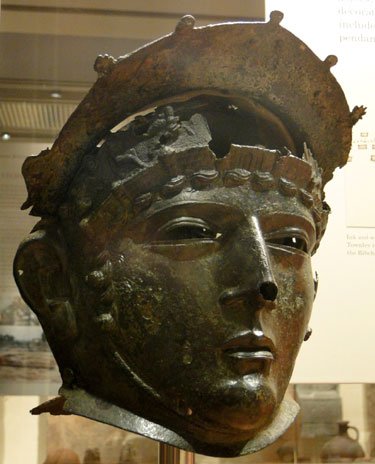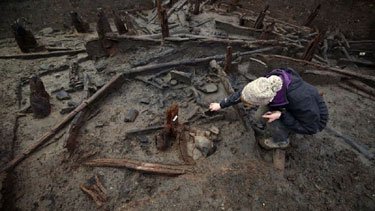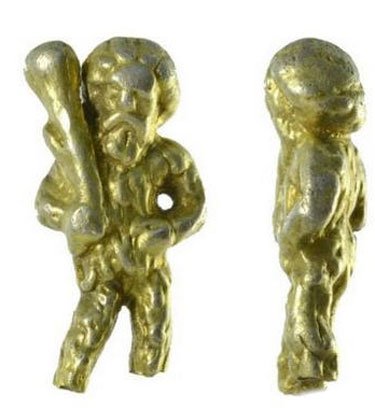Category Archive 'Britain'
05 Sep 2016


Petrified objects hang outside the entrance to Knaresborough’s well.
The Vintage News reports that they don’t allow you to drink the water today.
One of the most notable examples of petrifying wells is in Knaresborough, England. The Knaresborough petrifying well was first opened to the public in 1630 and still amazes people by its ‘abilities’ to this day.
For many centuries, locals believed that this Petrifying Well was cursed by the devil – a myth fueled by the fact that the side of the well looks like a giant’s skull. They constantly lived with the fear that if they touched the well’s water, they would be turned to stone too. …
History shows that the well wasn’t always known for its petrifying qualities. The earliest written reference to the well was by John Leyland, antiquary to Henry VIII, who visited the well in 1538. He wrote that the well was very well-known and visitors drank and showered under its falling waters, as they were believed to have miraculous healing powers. Around this time, the legendary prophetess Ursula Southeil, who is better known as Mother Shipton, began to gain popularity.
According to popular legend, Mother Shipton was a Yorkshire witch, born in the cave, who prophesied about future events in the form of poems. As Mother Shipton’s notoriety grew, so did the fame of the petrifying well.
In the early 1600’s medical physicians examined the waters, and pronounced that they could cure any malady that the body might have. Then, in 1630, King Charles I sold the land that the well sits on to Sir Charles Slingsby. Sir Slingsby must have been able to recognize a business opportunity when he saw one because he immediately put the well on exhibition and charged money for guided tours around his new property. The well and its surrounding area have been in continuous operation as an attraction since then.
It is often described as the UK’s first official tourist attraction. The cave and dropping well, together with other attractions, remain open to visitors.
14 Jul 2016


News of Theresa May’s accession to Prime Minister was eclipsed yesterday in some quarters by gushings over her husband Philip’s well-tailored, single-button blue suit.
Metro.Uk and Twitter went wild:
Theresa May became Britain’s new prime minister, but her husband’s big fashion moment stole the show.
Stepping into the limelight as First Man, Philip May showcased a sexy navy suit with a flourish of pinstripe.
Britain’s new Prime Minister Theresa May speaks outside 10 Downing Street in central London on July 13, 2016 on the day she takes office following the formal resignation of David Cameron. Theresa May took office as Britain’s second female prime minister on July 13 charged with guiding the UK out of the European Union after a deeply devisive referendum campaign ended with Britain voting to leave and David Cameron resigning. / AFP PHOTO / OLI SCARFFOLI SCARFF/AFP/Getty Images
Theresa May’s speech in full as she becomes Prime Minister
A single fastened button at the waist helped show off his fantastic figure and a pale blue tie brought out the colour of his eyes.
Round glasses perched on his nose accentuated his amazing bone structure – no doubt one of the assets he used to help him to bag his wife.

—————————————–
Mr. May’s haberdashery has evidently been attracting complimentary attention in the media for some time. Marie Claire actually devoted a feature to his suits and ties, noting approvingly that he frequently coordinates his outfits with hers.

Jasmin Nahar, at Buzz Feed UK, is envious of the PM:
A man who can dress himself and has a job? Where do I sign up?
05 Jul 2016


Rudyard Kipling, 1865-1936.
Noel Annan, Our Age: English Intellectuals Between the World Wars: A Group Portrait:
[Britain’s Edwardian] serenity was misplaced. Astute observers at home warned that Britain was losing its industrial supremacy and was indifferent to its ill educated population. Acute observers abroad declared that the solidarity of British life was an illusion. The American historian Brooks Adams (brother of Henry) forecast the departure of Britain from the historical stage. The steel production of the United States and Germany was overtaking that of Britain; and the Boer war had revealed Britain’s inefficiency as a world power. Conrad heard the tumult beneath the surface of that thin crust men called civilization – the anarchist world of the secret agent or of Henry James’s Hyacinth Robinson. But there was one writer in particular who was aware how thin the crust was and who redefined the gentlemanly ethos, and it was often through his eyes that Our Age was told to admire it. That was Kipling.
Kipling wanted his generation to recall how much the gentleman owed to society. He valued the independence of the individual – as an artist how could he not? But the individual left on his own, isolated and lonely, disintegrated. Particularly in India where men and their wives died young, where to take one’s work seriously could result in madness because government, unlike in England, never achieved results. What prevented such a society from going over the precipice? Kipling answered: religion, law, custom convention, morality – the forces of social control – which imposed upon individuals certain rules which they broke at their peril. Conventions enabled men to retain their self-respect and even to live together under appalling circumstances. Those who break the conventions must be punished. Numbers of Kipling stories contain scenes in which the individualistic, the eccentric, the man who offends against the trivial rules of the club, are tarred and feathered with gleeful brutality. If the offender is not brought to heel, society will suffer. It is not worth spending much effort, Kipling thought, debating whether the customs, morality and religion of the place you live in are right or wrong. His contemporary, the anthropologist James Frazer, was informing the learned public that religion and magic were a kind of primitive science which would vanish as scientific knowledge spread; but for Kipling, as for Max Weber, religion was a social fact.
These forces of social control, as Kipling admitted, were harsh. The harshness could be alleviated by belonging to in-groups. These in-groups protect the individual, give him privacy, identity and self-confidence. They are the family, the school and the craft or profession you follow. These in-groups, too, teach us our place. We all need a course of indoctrination to find our place and, if you have come up in the world, to be taught it. But when the individual has proven himself in his in-group, and so long as he is not in the strict sense of the word of an eccentric, then the more daring his behaviour and the more abundant his action, the greater is the addition of joy in the world. Stalky was the prototype of this socialized individualism. He acted beyond the formal law of school or army regulations and possessed the gift of seeing himself from the outside in relation to society. In Kipling’s world action revitalized man. That was the obverse of suffering it caused. And suffering was inevitable. Political action is often not a choice between good and evil but between lesser and greater evil.
Social realities interested Kipling. The liberal pictures man as choosing goals to pursue and asks whether or not he is free to pursue them. Kipling thought that men and women were forced to accept those goals which their group or clan in society chose for them and only when they had accepted these constraints were they free to exercise their individuality and take it for a trot. He is not unlike Durkheim who saw the individual as a bolt which might snap if the nut of society held it too tightly, or by being too loose allowed it to vibrate. Excessive integration as in the officer caste in the Army could be as dangerous as imperfect integration.
Brought up in a society untouched for generations by civil wars, revolution or economic disaster, Kipling’s English contemporaries were never compelled to consider why society still continues to hang together. But in India Kipling was forced to consider it. He believed that man achieves happiness when he comprehends where he himself fits into the scheme of things. He has to realize that spring cannot forever be spring and that winter succeeds autumn. Since men continue to nurse illusions they must be taught the terms on which they are allowed to rise. Subject the upstart, therefore, to a course of indoctrination to bring his ambition within bounds and turn his children into gentlemen. Whereas for most of the greatest writers society, with its rules, conventions, customs, morality and taboos surrounding the sacred, is the enemy and their characters in fiction are depicted as locked in heroic combat with them, for Kipling they are a donnée with which mankind has to come to terms or perish.
Kipling therefore defined the gentleman differently from Trollope. His gentleman has come down in the world, is harsher, more meagre, with fewer graces and more limitations. The gentleman has now become the manager, the colonial administrator, the engineer and the skilled worker. You feel his gentleman is more beleaguered. He is threatened from above by the politicians, threatened from below by the lower orders who now have the vote, and threatened by the new barbarians in Europe. In the fable of England he wrote for his children Kipling scanned the future with anxious eyes. Would the wall of British civilization fall again before the democratic hordes of little men and the barbarians, the Prussian Winged Hats? Were not the younger rulers like Churchill tainted by the same ambition that made Roman generals overpower the emperor? Were not the financiers manipulating trade and industry to their own ends, were not luxury and wealth corrupting the ruling class and turning their children to flannelled fools at the wicket? What would be England’s fate?
05 Jul 2016


The Ribchester Helmet is a Roman bronze ceremonial helmet dating to between the late 1st and early 2nd centuries AD, … now on display at the British Museum. It was found in Ribchester, Lancashire, England in 1796, as part of the Ribchester Hoard. The model of a sphinx that was believed to attach to the helmet was lost.
Wikipedia:
The helmet was discovered, part of the Ribchester Hoard, in the summer of 1796 by the son of Joseph Walton, a clogmaker. The boy found the items buried in a hollow, about three metres below the surface, on some waste land by the side of a road leading to Ribchester church, and near a river bed. The hoard was thought to have been stored in a wooden box and consisted of the corroded remains of a number of items but the largest was this helmet. In addition to the helmet, the hoard included a number of paterae, pieces of a vase, a bust of Minerva, fragments of two basins, several plates, and some other items that the antiquarian collector Charles Townley thought had religious uses. The finds were thought to have survived so well because they were covered in sand.
The helmet and other items were bought from Walton by Townley, who lived nearby at Towneley Hall. Townley was a well-known collector of Roman sculpture and antiquities, who had himself and his collection recorded in an oil painting by Johann Zoffany. Townley reported the details of the find in a detailed letter to the secretary of the Society of Antiquaries, intended for publication in the Society’s Proceedings: it was his only publication. The helmet, together with the rest of Townley’s collection, was sold to the British Museum in 1814 by his cousin, Peregrine Edward Towneley, who had inherited the collection on Townley’s death in 1805.
In addition to the items purchased by Townley, there was also originally a bronze figurine of a sphinx, but it was lost after Walton gave it to the children of one of his brothers to play with. It was suggested by Thomas Dunham Whitaker, who examined the hoard soon after it had been discovered, that the sphinx would have been attached to the top of the helmet, as it has a curved base fitting the curvature of the helmet, and has traces of solder on it. This theory has become more plausible with the discovery of the Crosby Garrett Helmet in 2010, to which is attached a winged griffin.
09 Jun 2016


Charlotte Higgins, in the New Yorker, describes a 3000-year-old archaeological site near Peterborough where Bronze-Age round houses on piles were abandoned due to a sudden fire that burned pilings and dropped houses and their contents into a river thus preserving their contents and consequently offering an extraordinary picture of ordinary daily life in Britain 1000 years before the Roman Invasion.
[F]rom time to time, the soil pushes up clues, particularly in the fens, where the waterlogged earth creates anaerobic conditions that slow decay. One summer day in 1999, a local archeologist was walking at Must Farm, along the edge of a disused clay pit; at one time it was filled with water, but the water level had dropped enough to reveal some wooden stakes poking out. The Cambridge Archaeological Unit, which operates out of the university, an hour’s drive away, did some exploratory work and found, through radiocarbon dating, that the material dated from about 900 B.C. The site was monitored for several years, until Historic England, a government agency devoted to preserving the country’s heritage, began to press for it to be properly excavated. Last September, with funding from Historic England and the brick-making company Forterra, a team of about a dozen archeologists went to work.
Each day, they are making discoveries that are radically expanding the knowledge of Bronze Age Britain. The site is unparalleled in the U.K. for its wealth of artifacts and the pristine state of their preservation. Three thousand years ago, it was a settlement of wooden roundhouses, but life there ended abruptly: a fire tore through it, and the buildings collapsed, sank into the marshland, and were quickly entombed by silt and mud. “In archeology, very occasionally, there is the feeling that you have turned up just a week too late, that the people who were here have just moved on,†Mark Knight, the archeologist in charge of excavation at Must Farm, told me when I visited for a day in April. “This site has that feeling to it. Normally in Britain, when you dig, three thousand years of history seems manifest in the remains, because the most you tend to find is a few postholes and a potsherd. Here, somehow, the time span feels short. It’s so intact, so three-dimensional.†Inevitably, perhaps, the site has been nicknamed the Pompeii of Peterborough.
Read the whole thing.
05 Jun 2016


The Yorkshire Post describes Miles Cooper’s conversion from Hunt Saboteur and League Against Cruel Sports (LACS) activist to Field Sports participant and finally Master of Hounds.
I know it would be more interesting to say I had a road to Damascus moment, but there were no blinding lights. It was much more of a gradual process. I was living in a market town in Oxfordshire and I came to know many of the farmers who lived there. I guess the more I talked to them, the more I began to question the anti-hunt stance. I spoke to sheep farmers who explained that hunts were a viable way of managing the fox population, that they were more humane than snaring and shooting. These weren’t people trying to twist my mind. They were people who had the countryside and its best interests in their blood. They were simply explaining their point of view and given their wealth of experience it was right for me to listen, to think and to challenge my own views.â€
By the time a hunting ban became a serious prospect, Miles had decided that it wasn’t something that he could support. In April 2002, 13 years after going on his first protest he came out publicly as pro-hunting. “I suppose I could have gone quietly, but I decided that I should be open and honest, especially since I’d been so publically critical of hunting in the past so a press conference was organised at Westminster. Of course I had reservations and what I had to say went down like a lead balloon with former colleagues, but I’ve never had any regrets about doing it.†…
Over the intervening years Miles’s pro-hunting stance strengthened. So much so, he learned to ride and went out on his first hunt with the Warwickshire Hunt. He also breeds and works ferrets, shoots and hunts with his local pack of beagles.
“It felt a little surreal to begin with, but for me it was a natural next step,†he says by way of explanation. “Everything I have seen being part of the hunting world has only confirmed that the Government got it wrong and the current legislation isn’t fit for purpose. Take hares for instance: the law says it’s wrong to hunt a healthy hare but okay to hunt one which has been wounded first. It’s ridiculous, a nonsense and just downright perverse.â€
Miles moved to Yorkshire for work – he’s a manager at York’s Askham Bryan College, the largest land-based college in England – but it’s also here where his conversion from hunt sab to hunt master was complete.
“A colleague showed me an advert in Countryman’s Weekly magazine which said that a new pack of bloodhounds was being set up in Yorkshire and that anyone interested in helping should get in contact. Not many people get to contribute to starting a hunt from scratch, so I thought what have I got to lose? The answer to that was all my spare time and some of my hair, but I’ve loved it.â€
Miles admits that when he sees pictures of himself hunting, whether that be with the bloodhounds or out beagling, he occasionally has to do a double take, but he says he hopes his experience might help dent the long-lived stereotypes.
“Hunting isn’t a sport just for toffs. We are not a bunch of lords. Most people join a hunt because they love riding and sacrifice most other things in their life to pay for the upkeep of their horse. There is a real cross section of society in any hunt that you don’t get in a lot of places. I can tell you from first-hand experience that you don’t get wealthy being a hunt master. In fact, you just get older, greyer and poorer a whole lot quicker, but by God I wouldn’t have it any other way.â€
Read the whole thing.
All this goes to show that some people are capable of growth and education.
22 Mar 2016


The Great Britain Palma Rifle Team
UK Shooting News describes the latest supervisory crackdown by British authorities on firearms access.
Security services have quietly acquired the details of every single person in the UK with access to firearms and put them on a database with known terrorists. …
All new members of Home Office approved rifle clubs have their personal details – name, address, telephone number, and so on – transmitted to the police by the club. This data transmission is a condition of clubs securing Home Office approval, which is a legal status that allows non-firearm certificate holders to handle firearms and shoot at club events.
Once that information is received by the police, it is run through the same databases used to vet firearm and shotgun certificate holders: the Police National Computer, local force intelligence databases (such as STORM), the Police National Database (to look up the history of properties associated with that person), and Special Branch’s records.
Police forces typically make no response to applicants or clubs unless a person’s history returns a hit. Although the Home Office’s intent with this system was to allow rifle clubs to work together with police in managing risks associated with new members, in the one case where UK Shooting News’ author was involved as a club secretary, all the Metropolitan Police would say is “we would not grant this person an FAC [“Firearms Certificate”]†despite repeated questioning. It turned out that the prospective member in question had accepted a caution for ABH [“Assault Occasioning Bodily Harm”] when he was 18, having been caught up in a mass pub brawl. …
As well as rifle club members, FAC, SGC [“Shotgun Certificate” and RFD [“Registered Firearms Dealer”] holders and their servants, the database is likely to include armed forces personnel and reservists, police employees, volunteer cadet instructors, Border Force employees, security services employees, large civilian ships’ crews (signalling equipment is typically licensed as firearms), MoD contractors, some private security firms’ employees, and probably a multitude of other categories as well.
A conservative estimate of the number of people these categories cover suggests the numbers run into the millions – meaning that slightly more than 1 in 65 of the entire UK population is now on a state database alongside known terrorists. Moreover, the existence of a single database with personal details of people who can lay their hands on legal firearms is an instant target for hackers working in concert with organised crime, terrorists or even foreign state actors. The very fact that it exists makes every member of the licensed firearms community less safe and more exposed to criminals and terrorists.
21 Dec 2015


The Independent, earlier this year, published an intriguing graphic.
The genetic map shows 17 clusters of similarities in the DNA of modern-day people that echo major moments in history, such as the collapse of the Romano-British culture in the 5th Century and the subsequent rise of the Anglo-Saxons, and the Norse Viking invasion of the Orkneys in the 9th Century.
It also reveals much older movements and separations of people, such as the ancient ancestry of the Celtic people of North Wales who are probably descended from some of the oldest inhabitants of Britain, and the clear genetic division between the people of Cornwall and Devon that still persists along the county boundary of the River Tamar.
“It has long been known that human populations differ genetically, but never before have we been able to observe such exquisite and fascinating detail,†said Professor Peter Donnelly, director of the Wellcome Trust Centre for Human Genetics at Oxford University….
One of the most intriguing signatures seen in the genetics of present-day English is the arrival of the Anglo-Saxons from southern Denmark and northern Germany after the end of Roman rule in 410AD. The DNA samples showed this migration involved intermarriage with the Romano-British Celts rather than wholesale ethnic cleansing, as some historians have suggested.
“The results give an answer to the question we had never previously thought we would be able to ask about the degree of British survival after the collapse of Roman Britain and the coming of the Saxons,†said Professor Mark Robinson, an archaeologist at Oxford University.
“This has allowed us to see what has happened. The established genetic makeup of the British Isles today is reflecting events that took place 1400 years ago,†Professor Robinson said.
Other major events in history, such as the Roman invasion and occupation between 43AD and 410AD, the large-scale invasion by the Viking Danes in 865AD and the subsequent establishment of Danelaw, as well as the Norman invasion of 1066, cannot be seen in the genetic profiles of Britons today.
This probably reflects the fact that often major cultural shifts are carried out by relatively few people within an elite who do not leave their genetic mark on the conquered masses, said Sir Walter Bodmer, the veteran population geneticist who first had the idea of the study.
15 Dec 2015


Wild Man
BBC:
A 500-year-old artefact is one of the earliest depictions of a mythical figure from medieval Europe, an expert has claimed.
Metal detectorists found the spoon handle with an engraving of “Wild Man” near Woodbridge in Suffolk.
A leading historian has hailed the discovery as a “rare find”.
Some of the earliest writings about The Wild Man come from Spain in the 9th Century and he was described as “barbaric, chaotic and unrestrained”.
The 15th Century handle, found two years ago, was declared as treasure at an inquest in Ipswich this week.
Covered in leaves and brandishing a club, the hairy Wild Man was a popular medieval mythical figure mostly found in pictures and literature rather than on objects.
Professor of history Ronald Hutton, from the University of Bristol, said: “It’s certainly one of the earliest depictions of the Wild Man.
“There would have been earlier ones on manuscripts and tapestries but not like this.”
He said it would have been owned by someone “well-off” and from the “upper to middle class”.
People were fascinated by the creature who was “barbaric, chaotic and unrestrained”, he said.
23 Sep 2015


Brian Sewell, 1931-2015
Conscription no longer exists in Britain any more than it does in America, but some of the oddest people, including the late homosexual art historian Brian Sewell, believed that the experience of military service did them a great deal of good.
From Outsider (the first volume of his autobiography):
In my young days boys were prepared for life by dancing lessins and National Service, and of the two I much preferred the latter. Oh the misery and discomfort, the crippling sense of inadequacy engendered by the hours spent in the compelling arms of a corseted dancing mistress learning the quickstep, the foxtrot and the tango – to these the ingenious bullyings of strutting Warrant Officers and corporals proved infinitely preferable.
What did I learn from National Service? I learned to shoot with a cold accuracy that surprised the men who taught me. I learned to ride a motorcycle and to drive almost everything the Army had on wheels. I learned to pitch a tent and dig a trench and wriggle at a snake’s pace on my belly. I learned, if I did not already have them, the habits of neatness and economy. ‘Any fool can be uncomfortable,’ said one of my instructors, a Captain in the Gloucesters, lately wounded in Korea, and I learned from him to make silk purses out of sows’ ears. These were practical things that have stood me in good stead, but the less definable things have served me even better. In the intimacy of my platoon it was as though we had sworn the marriage vow to obey, serve, love, honor and keep each other in sickness and in health. We learned lessons in loyalty and interdependence that wove the platoon together; we learned that the strength of a group of men is the strength of the weakest member and that the weakest can be made stronger with forethought and support. With modesty and squeamishness abandoned I learned that compliance is not an easy option, but often the only option in a particular set of circumstances that one can do, and sometimes must, do things about which one has almost overwhelming intellectual and moral reservations, or that are deeply offensive to one’s taste. I think I learned – it was never put to the test – that there was nothing I would not do, that needs must when the Devil drives. I believe this still to be so, though my choices now might be significantly different. I learned too, that separation from my dog was more painful than separation from my parents.
Most of a lifetime later I am so burdened with moral baggage that I have perhaps lost the ruthlessness the Army taught me, but for decades I believed that my two years of National Service had done me far more good than my three as an undergraduate, my eight at school and twenty on my knees in church. National Service revealed depths and darknesses in my soul that I was grudgingly glad to know were there; if I am now capable of making worthwhile moral judgements it is because I was for two brief years a soldier of sorts, not because I am an art historian, a lapsed Conservative, an agnostic Christian.
/div>

Feeds
|
















